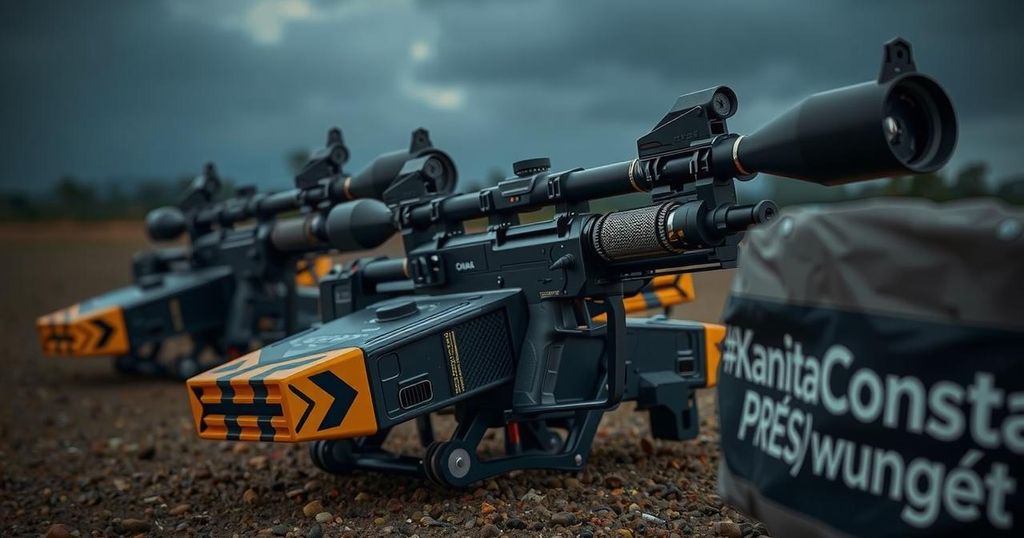Amnesty International Uncovers French Weapons in Sudan Conflict Violating UN Embargo
Amnesty International has revealed that French-manufactured defense systems are being used by the RSF in Sudan, potentially violating the UN arms embargo on Darfur. These systems, including the Galix reactive defense technology integrated into UAE-manufactured APCs, emphasize the urgent need for stricter global arms control to protect civilians amidst the escalating conflict, which has already caused significant humanitarian crises.
In a recent investigation, Amnesty International has uncovered the use of French-manufactured military technology in the ongoing conflict in Sudan, specifically on armored personnel carriers (APCs) deployed by the Rapid Support Forces (RSF). These vehicles, which include the Nimr Ajban APCs produced by the United Arab Emirates, are outfitted with the French Galix reactive defense system. Amnesty’s findings, which reveal this technology on the battlefield, suggest a violation of the existing United Nations arms embargo on Darfur, designed to prohibit all arms transfers to Sudan. The Galix System, created by Lacroix Defense in partnership with KNDS France, is designed to protect military vehicles by deploying decoys and smoke to counteract threats. As detailed by Amnesty International Secretary General Agnès Callamard, “Our research shows that weaponry designed and manufactured in France is in active use on the battlefield in Sudan.” This alarming revelation has prompted calls for the French government to halt all arms supplies that may end up in conflict zones, particularly if those systems contribute to human rights abuses. Amnesty International has reiterated that the international community must put an end to all transfers of arms to both warring factions in Sudan in light of the severe humanitarian crises stemming from this conflict. The organization has maintained that France, as a party to international humanitarian obligations, must enforce strict export controls to prevent the misuse of arms supplied to countries with questionable human rights records like the UAE. There is also an ongoing call to expand the UN arms embargo beyond Darfur to encompass the entire nation of Sudan due to the pervasive violence and suffering arising from the conflict, which has displaced millions and resulted in widespread casualties.
The conflict in Sudan erupted in April 2023, primarily battling between the Sudanese Armed Forces (SAF) and the RSF paramilitaries. The situation worsened, leading to one of the largest humanitarian crises globally, with over 11 million people displaced and thousands killed in the violence. The presence of foreign-manufactured arms, especially those from France, raises grave concerns about compliance with international arms embargoes, particularly the EU’s embargo instituted in 1994. This embargo is crucial for ensuring arms do not contribute to further violations of human rights or humanitarian law amidst ongoing conflicts. Lacroix Defense and KNDS France have been implicated in the illicit transfer of military technologies via UAE middlemen, which appears to contravene the embargo established to protect civilians in conflict areas. The longstanding defense relationship between France and the UAE complicates the oversight of arms transactions and raises ethical questions regarding the responsibility of manufacturers in ensuring their products do not fuel human rights abuses in conflicted regions.
The revelations by Amnesty International regarding the usage of French weaponry by the RSF in Sudan underscore a severe breach of international arms regulations, particularly the UN arms embargo targeting Darfur. The deployment of the Galix System highlights the consequences of arms trade oversight failures. In light of the growing humanitarian crisis in Sudan, it is imperative that all nations adhere strictly to arms embargoes and ensure that military technologies do not contribute to violations of human rights and humanitarian law. The situation demands immediate global action to prevent the escalation of armed conflict and further civilian suffering.
Original Source: www.amnesty.org




Post Comment